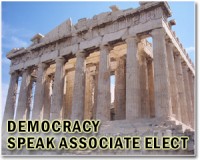| . |  |
. |
Havana (UPI) Apr 22, 2011 Fear of doing too much too soon and losing the grip on power has led Cuban leadership to stick to Plan A -- continue with business as usual while dipping toes into the unfamiliar waters of a market economy. Hopes of younger Communist Party adherents joining the ranks of the ruling elite ended when the first party congress since 1971 this week made official President Raul Castro's elevation as the new first secretary, succeeding elder brother Fidel, 84. The party also gave the go-ahead for 500,000 government workers to look elsewhere for earnings, a politically charged move sweetened by a much publicized encouragement to self-starters, entrepreneurs and would-be property tycoons. All Cubans can now buy or sell homes, albeit under strict conditions and set up shops and businesses. That left Cuba as the world's last stronghold of communism, of a sort, after Albania broke ranks and began experimenting with capitalism, taking cash from the European Union in return for advice on much needed fiscal reforms. Raul Castro, 79, heralded the reforms, warning Cubans to get ready for tougher times. Party newspaper Granma said ways of "working miracles are running out." In all 300 reforms were cited in the package laid before the congress but none that veered away from entrenched central planning. Food and fuel will become more expensive, subsidies will gradually disappear and small and tentative steps will guide Cubans toward what might eventually be recognizable as a market economy with a private sector set for slow but certain growth. The economic reforms package left unanswered major questions on political transition and easing of curbs on dissent and the media in preparation for developing a democratic infrastructure, a problem seen behind troubles in recently "liberated" societies such as Egypt and Tunisia. In addition to routine muzzling of dissent, Human Rights Watch and international human rights organizations have accused the two Castros administrations of systematic abuses, including torture, arbitrary imprisonment, unfair trials and extrajudicial execution. Although Cuba relaxed curbs on religious expression it retains tight control on religious institutions and affiliated groups. Partly due to the U.S. embargo, Internet access remains limited, expensive and largely restricted to hotels frequented by foreign tourists. The embargo began in 1960 after Cuba nationalized U.S. properties and toughened in February, 1962. Although it formally orders the most enduring trade embargo in modern history, the United States is the fifth largest exporter to Cuba. On Sept. 2, 2010, U.S. President Barack Obama extended the embargo to Sept. 14, 2011, determining it to be in the national interest of the United States. An April 2009 CNN/Opinion Research Corporation poll indicated 64 percent of Americans surveyed backed the lifting of the U.S. travel ban on Cuba and 71 percent supported a re-establishment of diplomatic relations. Cuba's reforms could sway more Americans toward the island, which expects its economy to grow 3.1 percent in 2011, up from 2.1 percent in 2010. At the same time, analysts said, the slow pace of reforms would likely encourage a larger informal sector to grow before a new market economy could begin to take shape. Fledgling capitalist Albania still has 50 percent of its economy in the unreported and unregulated sector -- the black economy, independent European data showed. Corporate and public sector corruption, organized crime and huge income disparities are rife, the data indicated. That's a phase that Cuba, too, may go through before it recasts itself as a quasi-capitalist economy, analysts said.
Share This Article With Planet Earth
Related Links Democracy in the 21st century at TerraDaily.com
 New Haiti president vows to create 'modern army'
New Haiti president vows to create 'modern army'Washington (AFP) April 21, 2011 Incoming Haiti president Michel Martelly vowed Thursday to create a "modern army," saying the violence-prone Caribbean nation could not rely on UN peacekeepers forever for its security. After decades of political interference and dozens of coups, Haiti disbanded its military in 1995 and has become reliant since 2004 on a UN stabilization mission, MINUSTAH, which was authorized to disarm and ... read more |
|
| The content herein, unless otherwise known to be public domain, are Copyright 1995-2010 - SpaceDaily. AFP and UPI Wire Stories are copyright Agence France-Presse and United Press International. ESA Portal Reports are copyright European Space Agency. All NASA sourced material is public domain. Additional copyrights may apply in whole or part to other bona fide parties. Advertising does not imply endorsement,agreement or approval of any opinions, statements or information provided by SpaceDaily on any Web page published or hosted by SpaceDaily. Privacy Statement |